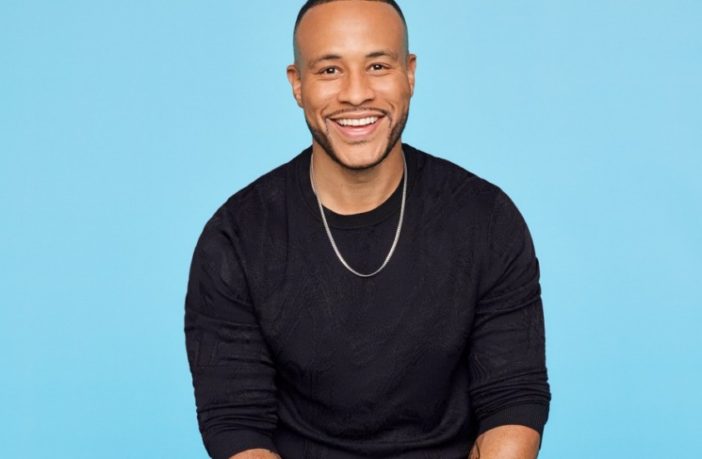The late 1960s and early 1970s brought about an era of immense and somewhat radical social change. One of those major changes that occurred during that time was the Jesus Movement—an Evangelical movement that centered Christian youth, referred to as hippies, in response to the challenges of the time.
The new film Jesus Revolution takes on the origin of this movement on the West Coast and the individuals who contributed to its widespread success. Producer, author, and now actor DeVon Franklin stars in the film as Josiah, a journalist for Time magazine who is sent to cover the phenomena of the movement’s emergence.
Franklin took time to speak with EBONY about his role in portraying a Black journalist of that era and his hopes for what audiences can takeaway from the film.
EBONY: Jesus Revolution takes us almost into a little time machine moment to experience one of the last religious revivals of American history. The film also showcases folks looking for something greater than themselves using religion and faith. They are simultaneously looking for spiritual liberation through core values to attach to. What do you think of when you hear liberation and how do you embody it on a daily basis?
DeVon Franklin: I embody it in this film as when I was first approached by the directors and the producers of the film asking me to be a part of it, my initial response was going to be “You know, I’m not an actor, right?” But I stopped myself. I had to be liberated from my own thinking of who I think I am to take the chance to explore and discover more of who I am and what I could possibly do. So taking on this role, working with an acting coach, preparing, and doing what I could do to be the best I could be in front of the camera was a sense of liberation. It freed me from a previous understanding of who I thought I was and introduce me to even more than I imagined I could be.
How did stepping into the role of Josiah, a Black journalist for Time magazine, who has so much skepticism about this movement, challenge you to think deeper about your own faith?
In preparing for the role, I researched Black journalists, Black newspapers, Time magazine and what was happening with the hippies then. All of that preparation gave me a perspective in the film of curiosity, not judgment. Maybe Josiah’s initial instinct was that the movement seemed crazy but what was he supposed to do. So the curiosity about the process is what I brought to the performance because I didn’t want Josiah to come off as judgmental. I wanted him to come off in a manner the audience might share.
Throughout time, we have seen Black journalists pushing the needle to uncover a deeper understanding of where we’re going as a country. Can you speak to how that was an integral part of this film?
There’s a moment in the movie where my character Josiah talks about how he’s covered wars and riots and the idea that the country, at that time, needed healing and love. So as a journalist, especially as a Black journalist, you think about what was happening in the late ’60s at the height of the Civil Rights Movement. You think about all that was going on in our fight for equality, justice and voting rights. So as a journalist, you were literally putting your life on the line to tell the stories. We as a culture and a community wouldn’t be here without those Black journalists and their sacrifices to tell the story. To have the opportunity to play one was an honor and hopefully an appropriate homage to Black journalists of the past and the present.
When folks watch this film and leave the theater with a bevy of emotions, what do you hope they take away?
That love is the answer. Acceptance, creating community and family through embracing and not shunning others is key. I want people to walk out of the theater, hugging whomever they came with and saying, “You know what, I’m going to make a commitment to be more loving.” So often the portrayal of what it means to be Christian gets filtered through a political lens. It’s not a political statement; it’s an emotional one. I think sometimes the church gets away from that as well. At the end of the day, what is the greatest commandment? Love God with all your heart and love your neighbor as yourself. That’s it. I think this movie sums it up perfectly.



